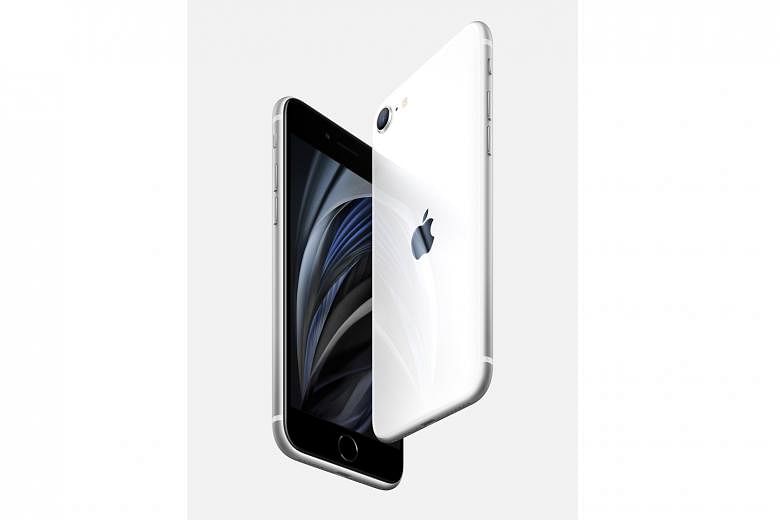The second iteration of Apple's iPhone SE is practically a dead ringer for the iPhone 8, starting with its front and back that are made of glass (thus allowing it to support wireless charging) and its sides and chassis made of aluminium.
There are also the rounded edges, lack of a headphone jack (which the original iPhone SE had) and the 4.7-inch TrueTone display, which changes colour temperature according to the ambient lighting. The screen has thick bezels at the top and bottom to house the microphone/front-facing camera and Touch ID button respectively.
The only cosmetic difference between the two phones is that the Apple logo on the new iPhone SE's back is centred like the flagship iPhone 11 series. Indeed, even iPhone 8 (and iPhone 7) cases will fit this phone.
It is inside the phone where you will find a significant difference. The new iPhone SE has the same A13 Bionic chip of the iPhone 11 series. This is why I think the of this phone as an "iPhone 9" (the model number Apple skipped after the iPhone 8) as it is basically an iPhone 8 with the same rear and front-facing cameras, but upgraded with the latest Apple processor.
Like the iPhone 8, its compact size makes it great for one-handed use. But if you have been using the iPhone X, you will have to get reacquainted with old gestures such as swiping up from the bottom of the display to bring up the command centre.
The Touch ID makes a welcome return as everyone has to wear a face mask at all times when outside these days.
With the iPhone X, users have to enter the passcode each time they want to unlock the phone because its Face ID feature cannot recognise a masked face. For essential workers who need to wear a mask all the time, Touch ID would be even more appreciated.
The new iPhone SE nearly matches its flagship cousins in processing speed. In the Geekbench 5 benchmark test, it scored 1,331 (single-core) and 3,072 (multi-core). The iPhone 11 scored 1,328 (single-core) and 3,384 (multi-core).
But its performance in this test is better than Samsung's latest flagship Galaxy S20 Ultra, which scored 917 (single-core) and 2,769 (multi-core). Playing games such as racing game Asphalt 9 and shooter PlayerUnknown Battlegrounds Mobile feels smooth with no lags.
Given its entry-level status, I was not expecting its camera performance to be as good as that of its flagship cousins, given it lacks the rear dual-or triple-camera system or the TrueDepth front-facing camera of the latter.
It also does not have Night mode, and Deep Fusion technology that takes multiple shots and combines them for the best one. But it still has Portrait mode and Smart high dynamic range (HDR).
Comparing photos taken with my iPhone 11 Pro Max and the new iPhone SE, I found the HDR effect in landscape shots pretty similar, but the dark areas of the photos taken by the new iPhone SE are more grainy.
-
FOR
• Most affordable iPhone now
• Superb performance given its price
• Top-notch, one-hand handling
• iPhone 8 cases can be reused on it
• Good camera performance
-
AGAINST
• Same design as the iPhone 8
• Battery life could be better
• Rear camera lacks Night mode
-
TECH SPECS
PRICE: $649 (64GB), $719 (128GB), $889 (256GB, version tested)
PROCESSOR: A13 Bionic six-core chip with embedded neural engine
SCREEN: 4.7-inch LCD (1,334 x 750 pixels), 326 pixels per inch
OPERATING SYSTEM: iOS 13.4
REAR CAMERA: 12-megapixel wide-angle f/1.8
FRONT CAMERA: 7-megapixel f/2.2
MEMORY: 256GB, 3GB RAM
BATTERY: 1,821mAh
WEIGHT: 148g
-
RATING
FEATURES: 4/5
DESIGN: 3.5/5
PERFORMANCE: 4/5
BATTERY LIFE: 3.5/5
VALUE FOR MONEY: 4/5
OVERALL: 4/5
In addition, the bokeh effect on Portrait mode is not as natural as that of the iPhone 11 Pro Max. Plus, Portrait mode will not work unless it detects a person.
You can still take selfies in Portrait mode, though they pack less detail than selfies taken with the iPhone 11 Pro Max. But overall, the camera performance is still good for its price.
In The Straits Times' video loop test, the new iPhone SE lasted 6 hours 30 minutes compared with the iPhone 11's 11 hours and 20 minutes.
For standard usage, it should last a working day. But if you are a heavy user, a power bank might be needed.
Perhaps, the best feature of the new iPhone SE is its price. While its price range of $649 to $889 might seem pricey, it might not cost you anything if you sign a telco contract.
With the latest processor, Wi-Fi 6 support and given Apple's software support for old iPhones go for as long as five years, the new iPhone SE is not only the most affordable iPhone now, it could also save you money in the long run as it should be good enough to delay the urge to upgrade for a while.
In these trying times, this is the smartphone that users of older iPhones can upgrade to.


